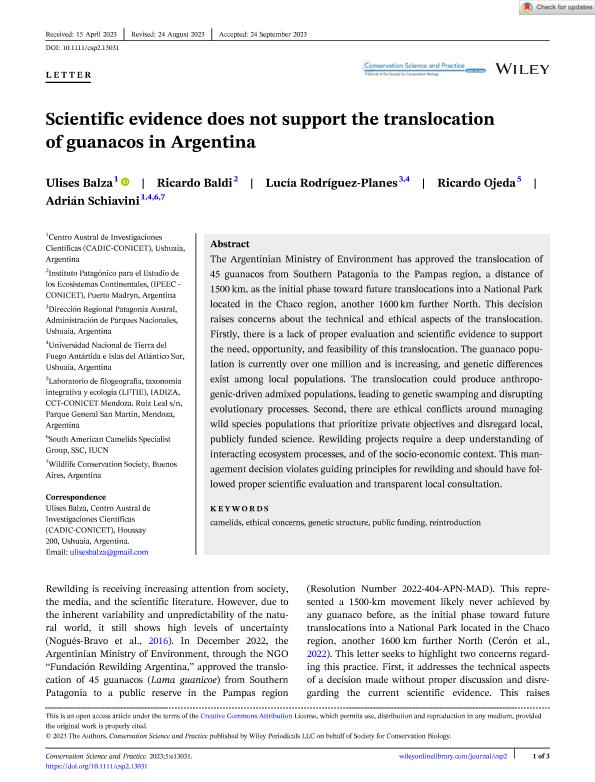Artículo
Scientific evidence does not support the translocation of guanacos in Argentina
Balza, Ulises ; Baldi, Ricardo
; Baldi, Ricardo ; Rodríguez Planes, Lucía Inés
; Rodríguez Planes, Lucía Inés ; Ojeda, Ricardo Alberto
; Ojeda, Ricardo Alberto ; Schiavini, Adrian Carlos Miguel
; Schiavini, Adrian Carlos Miguel
 ; Baldi, Ricardo
; Baldi, Ricardo ; Rodríguez Planes, Lucía Inés
; Rodríguez Planes, Lucía Inés ; Ojeda, Ricardo Alberto
; Ojeda, Ricardo Alberto ; Schiavini, Adrian Carlos Miguel
; Schiavini, Adrian Carlos Miguel
Fecha de publicación:
11/2023
Editorial:
John Wiley & Sons
Revista:
Conservation Science and Practice
ISSN:
2578-4854
Idioma:
Inglés
Tipo de recurso:
Artículo publicado
Clasificación temática:
Resumen
The Argentinian Ministry of Environment has approved the translocation of 45 guanacos from Southern Patagonia to the Pampas region, a distance of 1500 km, as the initial phase toward future translocations into a National Park located in the Chaco region, another 1600 km further North. This decision raises concerns about the technical and ethical aspects of the translocation. Firstly, there is a lack of proper evaluation and scientific evidence to support the need, opportunity, and feasibility of this translocation. The guanaco population is currently over one million and is increasing, and genetic differences exist among local populations. The translocation could produce anthropogenic-driven admixed populations, leading to genetic swamping and disrupting evolutionary processes. Second, there are ethical conflicts around managing wild species populations that prioritize private objectives and disregard local, publicly funded science. Rewilding projects require a deep understanding of interacting ecosystem processes, and of the socio-economic context. This management decision violates guiding principles for rewilding and should have followed proper scientific evaluation and transparent local consultation.
Palabras clave:
CAMELIDS
,
ETHICAL CONCERNS
,
GENETIC STRUCTURE
,
PUBLIC FUNDING
,
REINTRODUCTION
Archivos asociados
Licencia
Identificadores
Colecciones
Articulos(CADIC)
Articulos de CENTRO AUSTRAL DE INVESTIGACIONES CIENTIFICAS
Articulos de CENTRO AUSTRAL DE INVESTIGACIONES CIENTIFICAS
Articulos(IADIZA)
Articulos de INST. ARG DE INVEST. DE LAS ZONAS ARIDAS
Articulos de INST. ARG DE INVEST. DE LAS ZONAS ARIDAS
Articulos(IPEEC)
Articulos de INSTITUTO PATAGONICO PARA EL ESTUDIO DE LOS ECOSISTEMAS CONTINENTALES
Articulos de INSTITUTO PATAGONICO PARA EL ESTUDIO DE LOS ECOSISTEMAS CONTINENTALES
Citación
Balza, Ulises; Baldi, Ricardo; Rodríguez Planes, Lucía Inés; Ojeda, Ricardo Alberto; Schiavini, Adrian Carlos Miguel; Scientific evidence does not support the translocation of guanacos in Argentina; John Wiley & Sons; Conservation Science and Practice; 5; 11; 11-2023; 1-3
Compartir
Altmétricas



